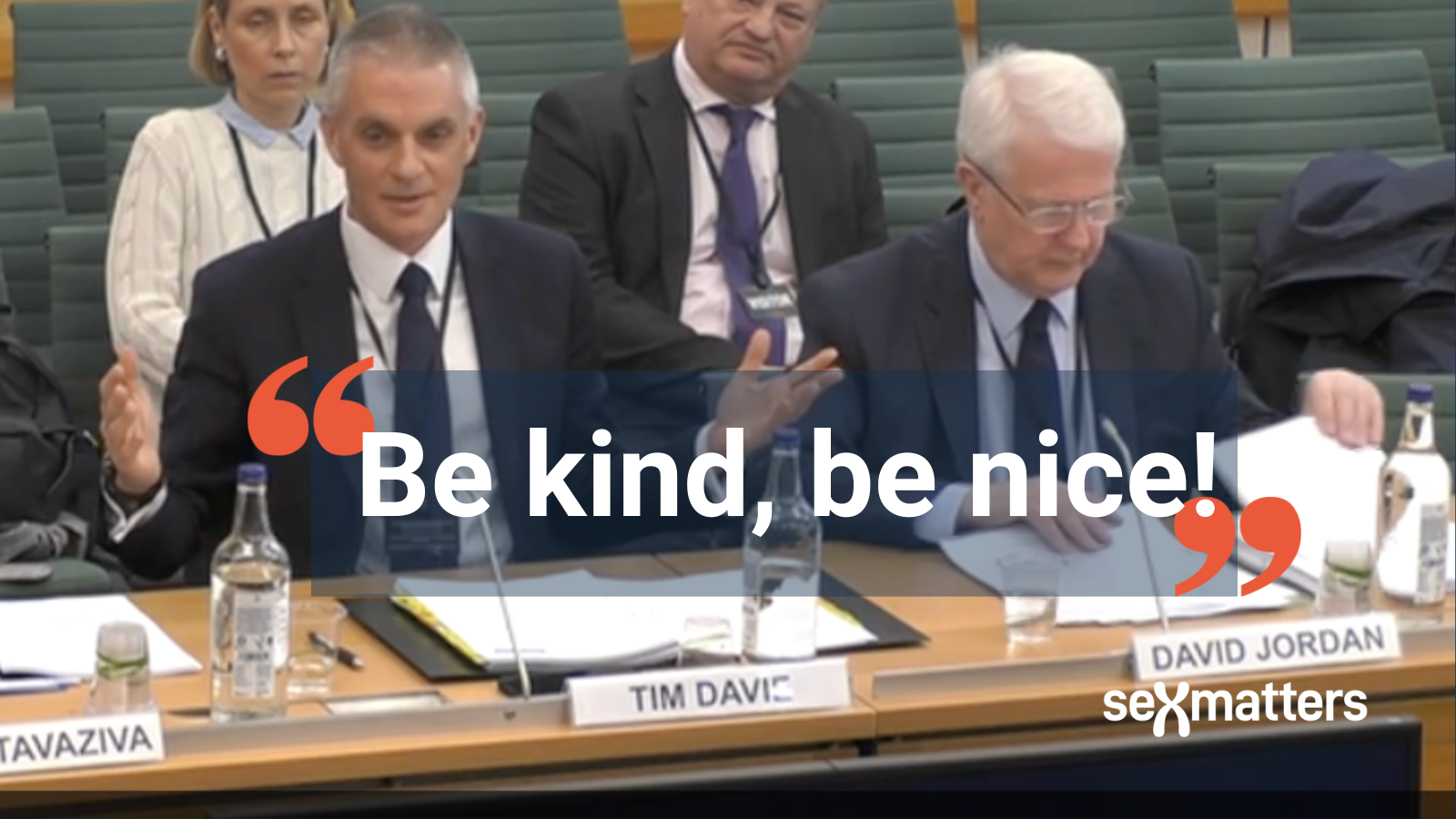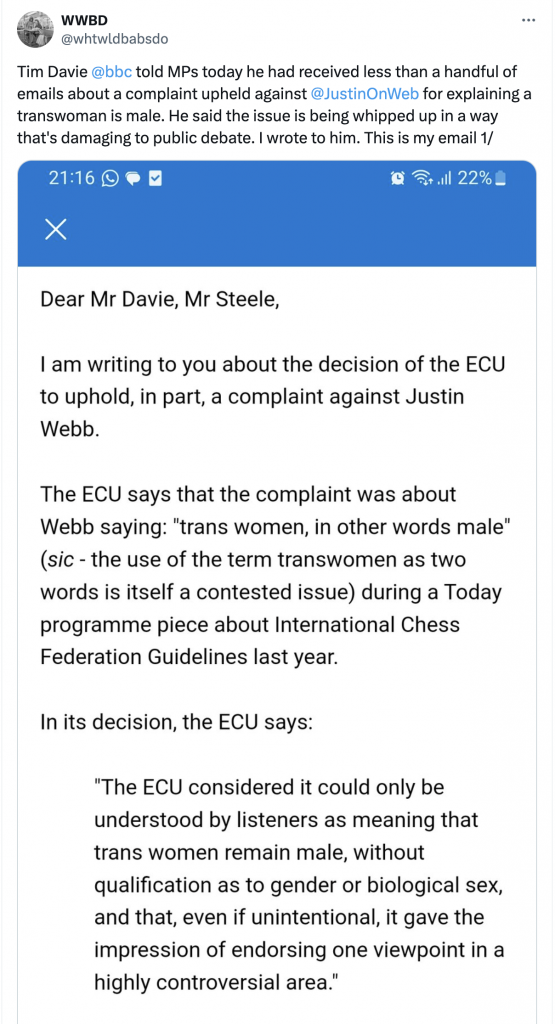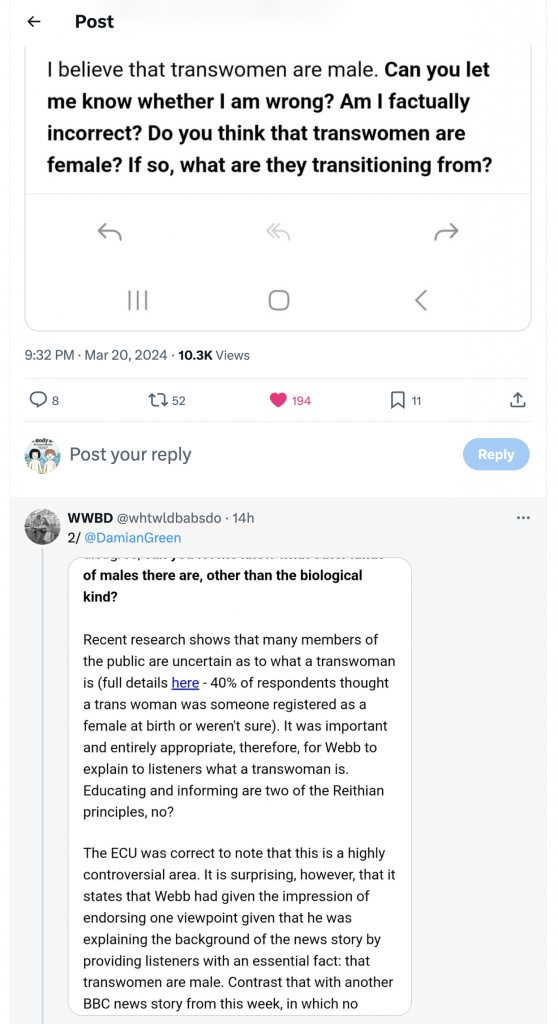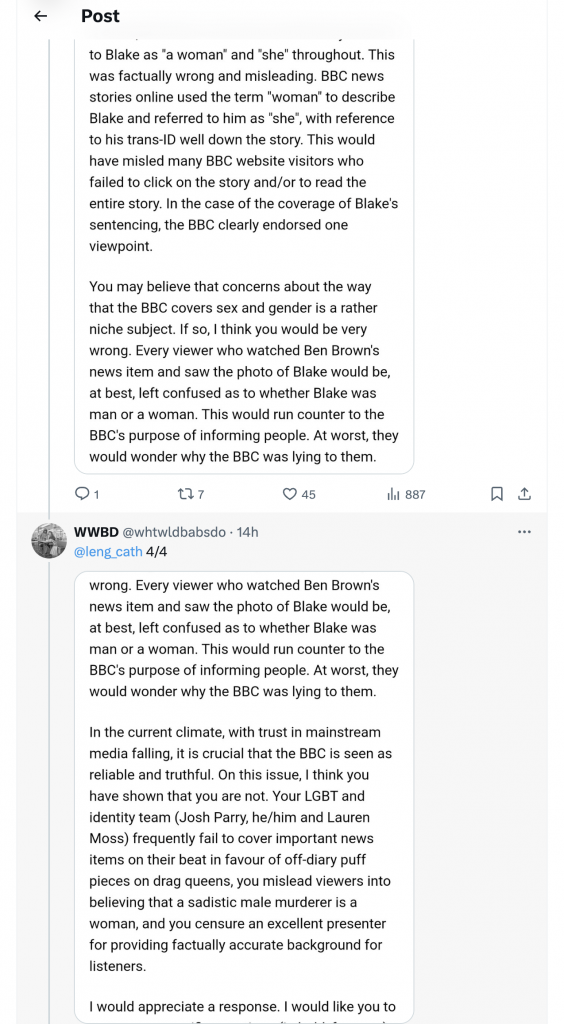“Be nice!” says the BBC’s director-general

The director-general of the BBC, Tim Davie, appeared at the parliamentary select committee for culture, media and sport this week. He was asked by Damian Green MP about the complaint upheld against Justin Webb for clarifying that transwomen “are, in other words, male”. Webb was reprimanded by the BBC’s executive complaints unit for saying this during an interview on the Today programme. Green said that the reprimand was being described as a clear sign of institutional bias at the BBC – that it was infused with Stonewall ideology; and “doesn’t treat the other side fairly”.
Davie denied any institutional bias in this area. He said:
“It is an area of controversy. Fact. It’s also an area where we need to have the confidence of our journalists to be able to ask, talk, discuss these areas, and we don’t have no-go areas in the BBC. To do that, we do demand of our journalists to keep within the editorial guidelines… [which] are clear in this area, not overly restrictive – they’re not one side of the fence.”
He then said: “We have to be kind and caring in this and listen to people, and be nice!” – this last with emphasis. Watch it on parliamentlive.tv from 10:16:28 onwards.
Saying “transwomen are male” is not allowed at the BBC
David Jordan, the BBC’s director of editorial policy and standards, pointed out that the BBC has ceased to have a corporate relationship with Stonewall (prompting some BBC staff to claim that the broadcaster is “institutionally transphobic”). He says that the Beeb is “very keen to report both sites of this debate which can become quite difficult at times in as fair a way possible”. It was “unfortunate” that Justin Webb “didn’t define his terms a bit more”:
“Had he said ‘biological male’ or ‘born male’ then it wouldn’t have been a problem. As you know it’s a very sensitive subject for trans women to be called male rather than female.”
This seems to be the crux of the matter. His argument is not that it is untrue but that certain male people don’t want to hear it.
He went on:
“That’s part of the debate and we need to steer very carefully through that difficult debate, make sure we are not offending either side of it or using terms that are clearly offensive to either side or seem to them to be taking sides in it. Had he talked about ‘biological male’ it would have been fine, it wouldn’t have been an issue. Just asserting that all trans women are male is not what the BBC’s style is on this. We did produce in December of last year a long note on reporting sex and gender in which all of this is made clear and all our journalists should have been aware of it.”
So Webb’s error was to offend some trans-identifying people, when the BBC’s style guide has been carefully crafted to save their feelings.
On the reporting of the murderer Scarlet Blake, Jordan claimed that the BBC used the terminology of the court report but should have used its own, and should have been clearer about “her status” as a “trans woman”.
“Deeply deeply damaging to civilised debate”
Davie seems to see this as part of a culture war.
“Let’s get real here. This is being whipped up around us in a way that’s deeply deeply damaging to civilised debate about these topics. Having said that, there are also people who care very deeply on either side of this debate and we need to hear that. To do that we’re holding the centre of the ring here and that is not much fun at times, I can tell you. That’s why I’m not in X [Twitter]. And I think our journalists are doing a very good job of it, if I may. A really good job.”
He called Webb’s clarifying statement a “foot fault”, saying “it was just a sentence that wasn’t quite right”. As if requiring our national broadcaster, for which we all pay, to adopt and promote a falsehood is no big deal. Remember, more than a third of the public are confused about whether a “trans woman” was born male or female. It matters.
Why this matters
The BBC’s director-general claims he wants to foster debate. He told the committee:
“This is important, we need to fight for this. What I’m interested in is preserving from a societal point of view an ability to bring together people to talk about these things… I’m quite animated about it as you can hear because I worry about it.”
We worry about it too, Tim. And if we can’t say who is male, we can’t have that debate. Anyone born male is still male, whether they like it or not, and although most of the time we don’t need to draw attention to that, sometimes we have to be able to say so. This is not two sides of a debate in which you can hold the centre ground. There is no centre ground on reality.
Jordan’s statement that trans-identifying males are offended by being called male not female is revealing. Davie says: “We’re a fiercely independent broadcaster.” He claims that the BBC can’t be leant on, and that it reports “without fear or favour”. Maybe it’s the organisation’s own staff he’s afraid of. BBC staff surveys report that more than 10% of staff are “LGBTQ+” and the staff LGBT network seems to have considerable influence.
Let Tim Davie know what you think
Tim Davie says he’s had just a handful of emails on this issue. We all know that accurate reporting of sex matters. Perhaps Tim should be reminded of the BBC Charter obligations: they say nothing about being kind, caring or nice. But they do require impartiality and accuracy (see section 6.1 of the charter document). Let’s hope the new chair of the BBC, Samir Shah, agrees.



